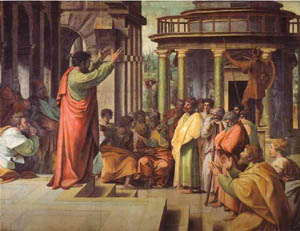This piece of history that was written
by Thucydides is indeed rhetorical, and an act of persuasion. His
intention in writing this history would be to inform people in the
future of what happens when there is a funeral for the deceased in a
war, as well what is said in that oration.
 He wrote this history in Athens during
the Peloponnesian War as he was in exile. This is interesting because
he was in exile because he was a leader of a failed military, and it
would only be fitting to give a history that had to do with the
military and war (kairos). In terms of his audience, he tried to make
it so everyone who read could understand. He gave an introduction at
the beginning so that people could understand the basics of what
would happen during a funeral ceremony after a war. And, to further
the understanding of his audience, he gave a great example of a
funeral speech that would be given at one of these ceremonies. Also,
the people reading this could be us in the future, but were people of
Athens in his time. Regardless, he wanted his audience to understand
the power that an oratory has on people, and, as Andrew said in his
post, that it is also a history and a eulogy. Oratories are
history,because they talk about what has happened in the past, and
past events that a crucial to understanding history.
He wrote this history in Athens during
the Peloponnesian War as he was in exile. This is interesting because
he was in exile because he was a leader of a failed military, and it
would only be fitting to give a history that had to do with the
military and war (kairos). In terms of his audience, he tried to make
it so everyone who read could understand. He gave an introduction at
the beginning so that people could understand the basics of what
would happen during a funeral ceremony after a war. And, to further
the understanding of his audience, he gave a great example of a
funeral speech that would be given at one of these ceremonies. Also,
the people reading this could be us in the future, but were people of
Athens in his time. Regardless, he wanted his audience to understand
the power that an oratory has on people, and, as Andrew said in his
post, that it is also a history and a eulogy. Oratories are
history,because they talk about what has happened in the past, and
past events that a crucial to understanding history.
The audience in Pericles's speech were
people who lost loved ones, so they would be more inclined to listen
to their speaker because he is talking about their loved ones who
have died. Also, since this is a funeral oratory, the whole speech
itself would be presenting pathos. This is because a funeral is an
emotional ceremony since one mourns for those who have passed on,
provoking and relating to feeling. The oratory is epideicic as well,
because Percicles was talking about something that was happening in
their present time (or past), and he was also praising the city that
the warriors fought for, and the people who made the city a free
nation. Thucydides may have wanted his audience to see these things,
and see that reflecting history through an oratory could present such
a deeper meaning, and therefore would be understandable to us because
we can relate to those emotions.
I think that Pericles' speech was mostly comprised of logos--but that is not the ordinary for a funeral speech (as you stated). Normally, one would focus on pathos--to console to grieving. However, the way that Pericles twisted his logos to seem like pathos was what makes the speech well-suited to fit his purposes.
ReplyDeleteI think the speech was mostly ethos... If George Washington was know to be a champion of good, old-fashioned American Freedom, and if this fact was conveyed to mourners at his funeral, those who left would certainly be holding onto their own star-spangled banners. the best endorser for an idea is the person in the coffin.
ReplyDeleteI would agree that Pericles and Thucydides used rhetoric to explain history- to me it is the most effective way to really understand the entirety of what was happening at the time. I also agree with Alisa that Pericles used a twisted form of Logos to seem like pathos- clever tactics... never thought about it like that
ReplyDeleteSomething I would be interested to hear is your opinion as to whether Thucydides is a credible source. How much do you think he altered or twisted the words and context? Do you think we can believe most all of what he says? I think that would be a revealing way to add to your post.
ReplyDelete